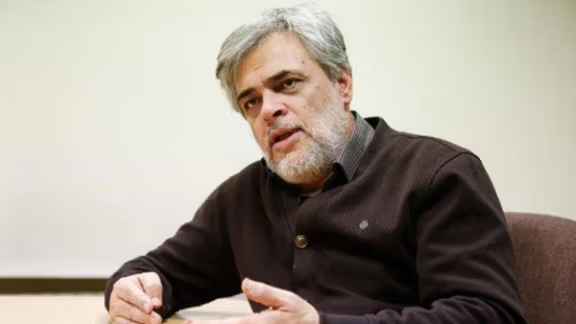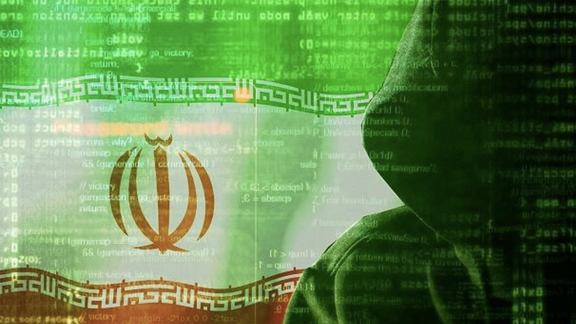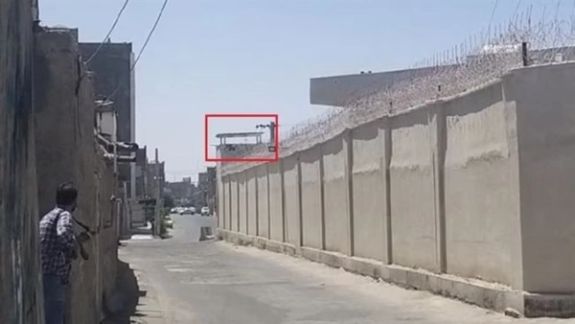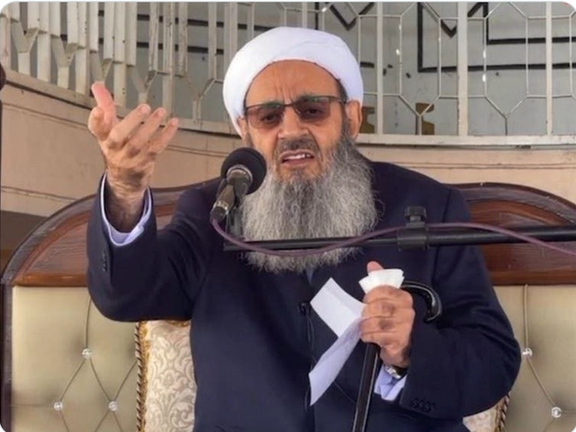Iranian Journalist Arrested After Raid On Her Home

Nazila Maaroufian, a journalist and student at Allameh Tabatabai University in Tehran, was arrested on Saturday following a summons to the Prosecutor's Office at Evin prison.

Nazila Maaroufian, a journalist and student at Allameh Tabatabai University in Tehran, was arrested on Saturday following a summons to the Prosecutor's Office at Evin prison.
Her arrest occurred after security agents from the intelligence ministry raided her home last week and ordered her to appear at the prosecutor's office.
In a tweet, she shared the details of the government agents' invasion of her home to conduct a search and confiscate her personal belongings. She emphasized that despite Iranian citizens being deprived of safety even within their own homes, they should persevere and not surrender.
Maaroufian was previously employed by the moderate Iranian news website Rouydad 24, which had been a reliable source of news about developments in Iran.
However, in March, the Iranian regime blocked access to the website after it published an interview with Amjad Amini, the father of Mahsa (Zina) Amini.
Mahsa Amini, a Kurdish Iranian woman, died in the custody of the "hijab police," sparking the current wave of anti-regime protests, which are the largest the Islamic Republic has faced since its establishment in 1979.
Nazila Maroufian and Marzieh Amiri, journalists from the outlet, were imprisoned due to the interview and their reports on the protests.
After 72 days of detention, Maroufian was temporarily released from Gharchak Varamin prison on a bail of six billion rials. However, she was later sentenced to two years in prison on charges of "propaganda and publication of lies."

As rivalry between conservative groups in Iran is getting more overt ahead of the March 2024 parliamentary elections, name calling and accusations become public.
A moderate conservative figure has branded the members of ultraconservative party Paydari [steadfastness] “political businessmen” out to secure power and make money.
Mohammad Mohajeri, a former hardline conservative figure turned “moderate” who was once one of the editors of hardline daily Kushan, says the ideological games being played by Paydari are nothing but moves to secure the interests of ultraconservative politicians.
Mohajeri said in an interview widely covered by the Iranian press this week that moves to expand power and influence have spread to the state television, where leading Paydari member Vahid Jalili, a brother of former nuclear negotiator and Khamenei confidant Saeed Jalili, has been placing likeminded individuals on key posts ahead of the elections.
Exerting influence on the state TV is key to electioneering in Iran because it is the only broadcaster in the country. It targets regime supporters and promotes Supreme Leader Ali Khamenei’s hardline political views. However, it has lost its reach and influence among the middle class to a great extent after the disputed presidential election in 2009.
Mohajeri charged that state TV chief Payman Jebelli has put the national broadcaster totally at the disposal of hardliners by appointing Jalili as his deputy. He said that the television with its exclusive right to broadcasting in Iran has already been promoting the electoral agenda of the hardliners and paving the way for a landslide victory for Paydari.

However, he pointed out that polls conducted in Iran show that the state TV has lost three quarters of its viewership in a decade and the ideological management is hurting its popularity even more.
Mohajeri pointed out that there are four major groups of conservatives in the Iranian political landscape: Paydari, the neo-cons around Majles Speaker Mohammad Bagher Ghalibaf, traditional conservatives close to former Majles Speaker Gholamreza Ali Haddad Adel, and another group that calls itself “moderate and rational.” From among these four groups, Paydari currently has the upper hand among regime insiders.
Mohajeri had said in another interview last week that “Paydari is President Ebrahim Raisi’s strategic ally,” and are most likely to give all their support to Raisi and the candidates he picks for the Majles election in March. He added that Paydari is working on a plan to minimize the turnout next March so that mostly regime supporters come out to vote and most of them cast their ballots for its candidates.
Furthermore, Gholamreza Ali Jafarzadeh Imanabadi, a former lawmaker from Rasht in northern Iran, revealed that Paydari has been reaching out to ultraconservative figures who they believe can secure votes, encouraging them to run as representatives of the party in the upcoming elections.
Reformist politician Mohammad Reza Javadi Hesar told Etemad Online on Wednesday that Paydari has been exploiting state television in a manner that has even frustrated other conservatives. He may have been referring to a report on the website of the IRGC-linked Tasnim News Agency, which stated that Jalili's actions at state TV have deeply annoyed individuals devoted to the ideology of the Islamic Republic.
In response to criticism, Jalili argued that he possesses the appropriate background for the position of deputy director at state TV, stating that some of his predecessors came from the IRGC and were experts on missiles rather than having a background in a cultural organization such as the Art Bureau of the Islamic Propagation Organization, where he previously worked before being appointed as deputy state TV director.

A state-sponsored Iranian hacker group recently employed a new infection chain to target a nuclear security expert at a US think tank.
Charming Kitten, also known as TA453, APT42, Mint Sandstorm, and Yellow Garuda earlier targeted high-value accounts in government, academia, NGOs, national security, and journalism.
As part of their recent operation, the IRGC-linked group used a benign email to begin a relationship with their target. Then they sent a follow-up email containing a malicious macro that directed the target to a Dropbox URL.
“Using a .rar and LNK file to deploy malware differs from TA453’s typical infection chain of using VBA macros or remote template injection. The LNK enclosed in the RAR used PowerShell to download additional stages from a cloud hosting provider,” a new analysis by Proofpoint says.
“The use of Google Scripts, Dropbox, and CleverApps demonstrates that TA453 continues to subscribe to a multi-cloud approach in its efforts to likely minimize disruptions from threat hunters. (...) Regardless of the infection method, TA453 continues to deploy modular backdoors in an effort to collect intelligence from highly targeted individuals,” Proofpoint said.
In April, Microsoft warned that hackers linked to Iran are targeting critical US infrastructure including transport, energy and ports. A report by Microsoft Threat Intelligence revealed the threat from the Iranian hackers, known as "Mint Sandstorm".
Initially engaged in reconnaissance, the subgroup eventually began attacking critical infrastructure organizations in the United States in 2022. In November 2021, the United States Justice Department indicted two Iranians, Mohammad Hosein Musa Kazemi and Sajjad Kashian, who were employed by Emennet Pasargad. During the 2020 presidential election, they allegedly conducted a cyber campaign "to intimidate and influence American voters".

The director general of the International Atomic Energy Agency (IAEA) has expressed dissatisfaction with Iran's level of cooperation with the nuclear watchdog.
Rafael Grossi made these remarks during a press conference after visiting the Fukushima Nuclear Power Station in Japan on Friday.
"The situation is difficult. Efforts related to the JCPOA [Joint Comprehensive Plan of Action] have currently stalled, so there is not much progress on that front. Cooperation with Iran is ongoing, but it is not at the level that I would prefer. I have conveyed this to my Iranian counterparts. We have several unresolved issues," Grossi stated.
He further mentioned that he had visited Iran in March, where he agreed on a joint statement and certain necessary steps to resolve existing disagreements. However, the implementation of this agreement has been "exceptionally slow."
"I am making efforts to expedite matters in order to prevent tensions from resurfacing in that part of the world," Grossi emphasized.
In June, Iran announced that it had reinstalled 10 cameras of the UN nuclear watchdog at one of its installations. These cameras had been removed last year when the agency's board of governors censured Iran for its lack of cooperation.
However, an Iranian lawmaker stated last week that reinstalling IAEA monitoring systems at the Esfahan (Isfahan) nuclear site went beyond the Safeguards Agreement and contradicted the "strategic action" law ratified by the parliament in December 2020.
Ali Khezrian was referring to a law, which imposed restrictions on nuclear monitoring by the IAEA. Since its passage, Iran has further limited international monitoring and inspections, adding complexity to the process of renewing the JCPOA.

The Iranian Writers Association is urging people and organizations around the world to support the Iranian protesters by becoming their voice and advocating for their rights.
In a statement issued on Saturday, the association condemned the crackdown on street protesters, the wave of arrests, instances of torture and intimidation, and the imposition and execution of death sentences by the Iranian government. They further noted the ongoing oppression faced by women in various forms and the discriminatory working and educational environments for those who protest the compulsory hijab.
The association emphasized the importance of collective action in overcoming the challenges imposed by the government and called for a unified effort to address the issues faced by the Iranian people.
Earlier this week, a UN-mandated fact-finding mission made a plea to Iran to halt the execution of individuals sentenced to death for their involvement in the country's past anti-government protests. The mission urged Iranian authorities to provide access to judicial files, evidence, and judgments related to these individuals.
According to the fact-finding mission's report, the claim by Iranian authorities that 20,000 arrested protesters have been pardoned suggests that the actual number of detainees surpasses this figure. The report also highlighted the shocking execution of seven protesters and expressed concern over reports of coerced confessions obtained through torture.
The Iranian Writers Association's call for global support aims to shed light on the plight of Iranian protesters and detainees, seeking justice and an end to the ongoing violations of human rights in Iran.

An attack on a police station in Zahedan, a Sunni-majority city in Iran, claimed the life of two policemen, amidst lack of clarity about the incident.
According to Iranian law enforcement officials in Sistan-Baluchistan province, four gunmen attacked the police station using hand grenades and seized control of a watchtower. The attack was still ongoing as of noon local time. In early afternoon, officials said that all four gunmen were eventually killed and the situation around the heavily protected police compound returned to normal.
These circumstances suggest that since the attack began at around 7:15 am, it took hours to subdue the gunmen. This raises questions about whether the details provided by the authorities accurately represented the event.
Other reports have mentioned one or two suicide bombers detonating explosives to create an entry point for others into the heavily guarded premises. However, police officials insist that there were no suicide bombings and only hand grenades were used.
Tensions in Zahedan have been high since security forces, under the command of the Revolutionary Guard, killed an estimated 80-90 civilian protesters in the city on September 30, 2022, marking the start of anti-regime nationwide protests in Iran. This tragic event became known as Black Friday.

Since then, the people of Zahedan have been participating in peaceful demonstrations every Friday after prayers and sermons by their respected religious leader, Mowlana Abdolhamid.
One hour after the attack began, Abdolhamid disassociated himself from the incident and called for peace and security. However, some speculate that the authorities can use the incident to restrict his freedom, possible putting him under house arrest.
The authorities have attempted to intimidate and silence Abdolhamid, who has strongly criticized the rulers of the Islamic Republic in his sermons. He has called for a referendum on the future of the country, respect for women, the release of political prisoners, and genuine elections.
The government has failed to launch a proper investigation into the mass killings that occurred during Black Friday, which has been one of Abdolhamid's demands. No security officials have been arrested or suspended.
Some reports suggested that the police station - precinct #16 - was the compound from where security forces opened fire on September 30, 2022, because it was close to the main mosque where people began their protest march.
Although incidents of attacks against security forces have occurred in the impoverished and desolate province for years, the general population has remained peaceful. On June 30, Zahedan residents held a silent march in the city.
In this instance, no one knows who the attackers are and it cannot be ruled out that the whole incident could have been staged by security and intelligence organs to clamp down on Zahedan's residents and particularly Abdolhamid.
In recent weeks, the regime has escalated pressure on the outspoken cleric by arresting several individuals from his inner circle and supporters. Additionally, Abdolhamid has been prevented from leaving Iran for the annual Hajj pilgrimage in Saudi Arabia.
In June, his grandson and several aides were arrested. The Makki Mosque, Abdolhamid's headquarters in Zahedan, has become a center of resistance against the government since September 2022. It is where Abdolhamid delivers his weekly sermons, openly criticizing Supreme Leader Ali Khamenei's regime.
These arrests followed reports that the Revolutionary Guard's intelligence arm had assigned a hitman to poison and kill the prominent Sunni cleric. Security guards at Makki Mosque apprehended a man posing as a religious student who allegedly intended to assassinate the Sunni leader.
Last updated at 16:00 GMT, July 8